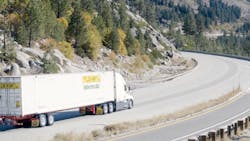Big Trucking Name Sees Supply Chain Kinks Continuing
Editor’s note: Geert De Lombaerde writes about markets and economic trends for Endeavor Business Media publications IndustryWeek, FleetOwner, Oil & Gas Journal, T&D World and Healthcare Innovation.
If you’re looking for some trucking executives to stick out their necks and tell you the global supply chain will soon be running more smoothly, you won’t find them at J.B. Hunt Transport Services Inc.
Asked on trucking company’s fourth-quarter earnings conference call about an emerging consensus that the global supply chain situation will gradually improve in 2022 as various knots are untied, Chief Commercial Officer Shelley Simpson told analysts and investors she’s “not sure how much that consensus is optimism versus reality” and that her team is taking the pulse of clients of just how accurate that consensus will turn out to be.
“Throughout all of 2020 and 2021, when we would make a prediction, typically we were wrong,” Simpson said. “Although I would like to be optimistic, I think this latest round of COVID has caught everyone by surprise. So I can’t say that I feel optimistic about the supply chain challenges going away in the near-term. We are focused on making sure that we help our customers be right.”
That mindset helped produce a very nice fourth quarter for Arkansas-based J.B. Hunt: Revenues climbed 28% year over year to nearly $3.5 billion, while net income – helped in part by a 30% jump in intermodal revenue per load and higher margins at the company’s asset-light integrated capacity solutions group, among other things – popped 57% to $242 million.
Despite posting those strong numbers, company executives said Jan. 18 they would have the ability to do much more business were it not for continued supply chain obstacles. (See also: "Trucking analysts project 'steady' improvements for 2022" for a truck production perspective.) The sales team in J.B Hunt’s dedicated group, for instance, has booked more than 2,500 trucks of future business, a performance that COO Nick Hobbs said has led the team to lift its annual target to between 1,000 and 1,200 trucks’ worth from its range of 800 to 1,000.
But equipment deliveries continue to be delayed: The arrival of about 6,000 containers, nearly the same amount of gear J.B. Hunt actually acquired in 2021, has been pushed into the first half and intermodal group leader Darren Field said the company will order more beyond that number. But given the ongoing uncertainties – the situation in China could get more challenging soon – the J.B. Hunt team isn’t yet ready to give out specifics on that.
“I am aware that I have given direction on […] the last two calls of equipment count expectations and we haven’t met either of those so I don’t want to give too much out there. But certainly, we are trying to get all of that equipment here just as soon as we can,” Field said. “With all of the talk of velocity challenges in 2021, we are going to be a little bit careful watching what comes from velocity improvements.”
The slow arrival of extra equipment also has bumped up J.B. Hunt’s 2022 capital spending plans. CEO John Roberts and his team plan to shell out $1.5 billion this year, with both containers/trailers and tractors being allotted about $700 million. That’s a big bump from the $877 million the company spent on equipment and other capital projects in 2021, although its initial goal was $1 billion.
Shares of J.B. Hunt (Ticker: JBHT) were flat Jan. 19, ending the session around $202. They have climbed more than 25% over the past six months, growing the company’s market value to more than $21 billion.
About the Author
Geert De Lombaerde
Senior Editor
A native of Belgium, Geert De Lombaerde has been in business journalism since the mid-1990s and writes about public companies, markets and economic trends for Endeavor Business Media publications, focusing on IndustryWeek, FleetOwner, Oil & Gas Journal, T&D World and Healthcare Innovation. He also curates the twice-monthly Market Moves Strategy newsletter that showcases Endeavor stories on strategy, leadership and investment and contributes to other Market Moves newsletters.
With a degree in journalism from the University of Missouri, he began his reporting career at the Business Courier in Cincinnati in 1997, initially covering retail and the courts before shifting to banking, insurance and investing. He later was managing editor and editor of the Nashville Business Journal before being named editor of the Nashville Post in early 2008. He led a team that helped grow the Post's online traffic more than fivefold before joining Endeavor in September 2021.
